- Home
- David Gemmell
White Wolf: A Novel of Druss the Legend dt-10 Page 27
White Wolf: A Novel of Druss the Legend dt-10 Read online
Page 27
Agasarsis pitched face forward to the earth.
Skilgannon dropped his sabre and walked back to the Queen. He bowed, and Servaj saw that his face was set, his eyes angry. ‘Agasarsis was the best cavalry commander we had, Majesty,’ he said. ‘This was madness.’
‘Indeed it was,’ she agreed. ‘Behold the man responsible.’ She gestured to the herald, who sounded the horn twice in succession.
Two of the Queen’s trusted bodyguard, Askelus and Malanek, came into sight, leading a bound man. His eyes had been torn out, and his face was a mask of blood. Even so Servaj recognized the Prince Baliel. The man was sobbing piteously.
Askelus dragged him out to stand alongside the fallen Agasarsis. The Queen rose from her chair and walked out to the centre of the circle. ‘Our war is almost won,’ she said, her voice ringing out over the seated men.
‘And why? Because of your bravery and your loyalty. Jianna does not forget those who serve her faithfully. But this creature,’ she cried, pointing to the pitiful Baliel, ‘put all your courage at risk. My gratitude to my friends is infinite. My enemies will always find that my vengeance is swift and deadly.’ Askelus drew his sword and plunged it into the belly of the blinded man. His scream was hideous. Servaj saw Askelus twist the blade, then wrench it clear. Disembowelled, Baliel fell to the ground, and began to writhe in fresh agony. The Queen let the sounds go on for a while, then signalled Askelus. The soldier drove his sword through Baliel’s neck. The silence that followed was total. ‘So die all traitors,’ said the Queen.
Someone began to chant: ‘Jianna! Jianna!’ Servaj saw it was the former swordmaster Malanek. Other men began to follow his lead, but the cheering was not enthusiastic. Jianna raised her hands for silence. ‘When we have taken Perapolis every man in my army will receive three gold pieces, as a sign of my love and gratitude.’
Now the cheering began in earnest. Servaj shouted in jubilation, along with the others. Three gold coins was a fortune. Even as he cheered, however, he glanced at Skilgannon. The general looked troubled.
Shaking himself from his memories Servaj returned to the problem at hand. The Damned had been sentenced to death, and it was left to Servaj to determine the manner of his execution.
He had under his command a number of good swordsmen, but none with the skill of Agasarsis. Skilgannon was staying at the Crimson Stag.
There would be no opportunity to poison his food.
Servaj thought the problem through. There would need to be an attack on the general. Five, maybe six men. And two men with crossbows, hidden close by. Even this was fraught with risk. He would have to visit the alchemist. If the crossbow bolts were tipped with poison, then even if Skilgannon escaped the ambush he would die later.
How, though, could he ensure Skilgannon came to the place of his execution?
249
CHAPTER THIRTEEN
BACK AT THE CRIMSON STAG SKILGANNON WAS DELIGHTED TO
FIND that two merchants had vacated a room overlooking the harbour.
He paid Shivas an extortionate four silver pieces for two nights, then went upstairs to the room and closed the door. He had not been aware that his need for solitude was so great. Even the muted noise from the tavern below was welcome, for it emphasized that he was alone now. Lifting the Swords of Night and Day from his shoulders he dropped them to the bed, then pushed open the window and gazed out over the ocean.
The reunion with the Old Woman had been hard — bringing back memories he preferred to forget. Something in him had died that night, along with Molaire and Sperian. In truth he did not know what it was.
Childhood perhaps. Or innocence. Whatever the answer, his heart had withered like a flower in the frost.
The planning of the escape from the city had taken days and nights, as each idea he put forward was discussed and dismissed. The Old Woman offered to take them through the gates in the back of a loaded wagon, hidden beneath sacks of grain. Skilgannon disliked this idea. Were he the Captain of the Gates he would search all conveyances. They talked of separating, and meeting later in the forest of Delian, but this was too fraught with the possibilities of becoming lost. Eventually they decided on simple deception. The Old Woman fashioned a harness that Jianna wore below a torn and colourless knee-length dress. The leather straps of the harness hung down her back. Lifting Jianna’s left leg the Old Woman secured a strap to her foot, then bound the ankle tightly to the thigh.
Jianna complained of the discomfort. The thigh and calf were then bandaged, leaving the knee exposed. With great skill the Old Woman added to the disguise, using small strips of shaved pig skin, and partly congealed blood, which she pasted to the skin of the knee. Skilgannon watched it all, amazed. By the finish the knee looked like a stump covered in weeping, bleeding sores. The illusion was repeated on Skilgannon, this time twisting his left arm up between his shoulder blades. She also added, using a mixture of white candlewax and a foul-smelling balm, three long scars to his left cheek and eyebrow. Once she had fashioned an eyepatch for him Skilgannon gazed into a cracked mirror. The face he saw looking back at him seemed to have been raked by the talons of a bear. Lastly the Old Woman cut away the dyed parts of Jianna’s hair, leaving her with a short, boyish hair style.
She allowed them an hour to become used to their acquired deformities. Jianna spent it practising with a pair of old crutches.
Skilgannon merely waited, his crooked and tied arm pulsing painfully.
Finally they set out in the Old Woman’s wagon. She stopped some three hundred paces from the East Gate. Already lines of supplicants were queuing there, waiting to be allowed on the two-hour walk to the Maphistan Temple, and the yearly opening of the Chest of Relics. As far as Skilgannon knew there had been no reported miracles for years, but it didn’t stop the diseased and the lame from making the annual trip, to kneel before the bones of the Blessed Dardalion, and the faded gloves of the Revered Lady. The richest of the supplicants were allowed to kiss the hem of the robe said to have been worn by the immortal Silverhand, whose death two thousand years ago had caused a dead tree to bloom into life.
It was almost dusk as Skilgannon leapt down from the wagon, then clumsily helped Jianna. She half fell against him and swore. The Old Woman passed down her crutches. Jianna took them and slowly made her way to join the line. Skilgannon fell in behind her, and waited.
Guards were stopping everyone at the gate, and questioning all young women. In the shadows by the gatehouse Skilgannon saw three men standing, watching the crowd intently. He moved alongside Jianna, and tapped her arm. ‘I see them,’ she whispered.
‘Do you know them?’
‘One of them. Keep moving.’
As Skilgannon approached the guards he longed to have his hand on the hilt of his sword, but did not. Head bowed, he shuffled forward with the others. A guard stepped in front of him and looked hard at Jianna.
Leaning forward he lifted her skirt, then let it go. ‘What happened to you?’
he asked sympathetically.
‘Wine wagon ran over it,’ she said, her voice coarse.
‘I don’t think the relics will grow you a new one, lass.’
‘I just want it to stop turning green and stinking,’ she said. He stepped back, trying to mask an expression of distaste.
‘Keep moving then. And may the gods bless you,’ he said.
Jianna leaned on her crutches and followed the people in front. As Skilgannon moved to follow he saw Boranius walk from the gatehouse. A terrible rage flared in him, but he fought it down. Now is not the time, he told himself. Gritting his teeth he walked beneath the gate arch and out into the countryside beyond, keeping his eyes fixed on the distant tree line of the forest of Delian.
Laughter from the tavern below jerked him back to the present. Music had started, and men were clapping their hands, establishing a rhythm.
Obviously there was some entertainment going on, but Skilgannon had no wish to observe it.
Stripping off his jerkin, shirt and leggin
gs he stretched himself out on the bed. Only then did he notice the huge mirror fastened to the ceiling.
He stared up at the tattooed figure reflected there, meeting the cold stare of his double’s bright blue eyes. There was no trace of the idealistic youngster who had fled into the forest with the rebel princess. Idly he wondered what he might have become had he not met Jianna. Would he have been more content? Would Greavas, Sperian and Molaire still be alive? Would Perapolis now be a thriving city, full of happy people?
A great cheer sounded from the tavern below. Then a woman’s voice began to sing, the sound high and clear and beautiful. It was an old ballad about a warrior’s return to his homeland, in search of his first love.
Skilgannon listened. The song was overly sentimental, the lyrics maudlin, and yet the woman’s voice imbued it with a sense of splendour that overcame the mawkish sentiments. It seemed to offer fresh insights into love and its power, giving a magnificence to the man’s ultimate, life-giving sacrifice.
When the song ended there was a moment of silence, then a thunderous burst of applause. Skilgannon took a deep breath and closed his eyes.
For if love is the ocean, on which sail the brave, we should welcome the storm winds, and the wind-driven waves.
Even now he did not truly know what love was. Jianna had filled his heart. She still did. Was this the love the poets sang of? Or merely a mixture of desire and adoration? Memories of the times of tranquil harmony with Dayan both lifted his spirit and deepened his sorrow. Was this love? If so it was a different beast entirely from what he felt about Jianna. There were never answers to these questions. He had tormented himself with them every day back at the monastery.
Swinging his legs from the bed, he stood up and walked to the basin stand beside the harbour window. He poured himself a cup of water and sipped it, seeking to free his mind of thoughts of the past.
He heard a board creak outside his room and turned. Someone tapped at the door. Skilgannon felt his irritation mount. The tap was too light to be Druss, who would have hammered upon the frame and called out. It was probably the youth, Rabalyn. Skilgannon hoped he would not again request to travel with him.
Walking to the door, he pulled it open.
Garianne was standing there. She was holding a flagon of wine and two empty goblets. Her eyes were bright, her face flushed. As he opened the door she eased past him and walked into the room. Placing the goblets on the bedside table, she filled them with red wine. Lifting one, she drank deeply, then wandered to the window.
‘I love the sea,’ she said. ‘One day I will board a ship and leave them all behind. They can argue amongst themselves. I will be free of them.’
He stood quietly, watching her. She had removed her jerkin and was wearing a thin, figure-hugging shirt. Her leather leggings were also form-fitting, leaving little to the imagination. Skilgannon turned away.
Garianne swung towards him, then brought him a goblet of wine. ‘I do not drink,’ he said.
‘I drink to be alone,’ she told him, her voice slightly slurred. ‘It is a wonderful feeling to be alone. No voices. No demands. No shrill screeching and pleading. Just silence.’
‘I too like to be alone, Garianne. Now I would like to ask what you want of me, but I know that you do not like questions.’
‘Oh, I don’t mind questions. Not when it is me. Not when I am alone.
When they are with me questions make them all speak at once. I cannot think. Then my head swells with pain. It is uncomfortable. You understand?’
‘I cannot say that I do. Who is with you?’
She walked to the bed and slumped down. Wine spilled from the goblets in her hands. Carefully she placed them on the bedside table. ‘I don’t want to speak of them. I just want to enjoy these moments of peace.’
She pushed herself to her feet, swayed slightly, then began untying the waist band of her leggings. Pushing them down over her hips, she sat back on the bed and struggled to tug them over her ankles. Skilgannon moved across the room and sat down beside her. ‘You are drunk,’ he said. ‘You do not want to be doing this. Get into bed and sleep it off. I’ll take a walk and leave you to… enjoy your privacy.’
Reaching up, she curled an arm round his neck. ‘Don’t go,’ she said softly. ‘I want to be alone inside my head. But not out here. Here I need to touch, to hold. To be held. Just for a while. Then I will sleep. Then I will be Garianne again, and I will carry them all with me. I am not drunk, Skilgannon. Or at least not much.’ Tilting her head she kissed him lightly on the lips. He did not draw away. She kissed him again, more deeply.
The walls he had built during three years of abstinence crumbled away in an instant. The scent of her golden hair, the softness of her lips, the warmth of her skin overwhelmed him.
All cares and regrets vanished. The world shrank, until all that existed for Skilgannon was this one room, and this one woman. The first lovemaking was intense and swift, the second slower, the pleasure extended. The afternoon faded into evening, and then into night. Finally, all passion exhausted, he lay back, Garianne’s head on his shoulder, her left leg resting on his thigh. She fell asleep. Skilgannon stroked her hair and kissed the top of her head. She murmured, then rolled away from him.
Rising silently from the bed he covered her with a sheet, then dressed.
Looping the Swords of Night and Day over his shoulder he walked from the room.
Earlier that afternoon Diagoras was sitting opposite Druss in the tavern, planning the route to Pelucid and discussing the supplies they would need. One of the difficulties was that Druss did not ride. On foot it would take half as long again to make the journey, and, logistically, require the travellers to carry more food. Diagoras patiently explained this to the warrior, who just shrugged and smiled. ‘When I ride it is painful for both me and the horse. In the saddle I can make a sack of grain look graceful. I walk, laddie.’
It was at that moment that Garianne, who had been sitting quietly with them, her expression serene, put down her wine goblet and walked to the dais on the eastern side of the tavern.
‘I think she is going to sing,’ said Druss, with a wide smile.
‘No-one will hear her in here,’ replied Diagoras, glancing around at the packed tavern, full of men talking and laughing, or arguing, or pitching dice on several long tables.
‘Would you like a small wager?’ asked the older warrior.
‘No. I always lose when I bet with you.’
Garianne carried a chair onto the dais then stood upon it silently, her arms outstretched towards the rafters. Diagoras gazed at her longingly.
The Drenai officer had always been attracted to long-legged women — and Garianne was also strikingly attractive. Several other men noticed her standing there, and nudged their companions. A hush settled on the room.
And Garianne began to sing.
It was one of Diagoras’s favourite ballads, and always brought a lump to his throat. But this girl’s rendition made it heartbreaking.
Every man in the tavern sat entranced. As she finished the song she lowered her arms and bowed her head. For a moment there was silence.
Then rapturous applause. Garianne moved back to the table, swept up a flagon of wine and two goblets and walked from the room, the applause following her.
‘Where is she going?’ asked Diagoras.
Druss shrugged and looked uncomfortable. Raising his hand he summoned a serving girl and asked for another flagon of Lentrian red.
‘What does she need two goblets for?’ continued Diagoras.
‘She’s an unusual lass,’ said Druss. ‘I like her.’
‘I like her too. But why don’t you answer my questions?’
‘Because I don’t care to, laddie. Her life is for her to live, as she sees fit.’
‘I didn’t say it wasn’t. And now I’m getting confused.’ Realization dawned. ‘Oh,’ he said. ‘I see. She has an assignation. Lucky man.’ Then his mood darkened as he guessed the identity of said lucky man. He s
wore softly. ‘Tell me she is not seeking Skilgannon,’ he said.
‘Don’t let it irritate you,’ Druss told him. ‘If it had been you up in that room, and him down here, she’d have gone to you. It’s not about the man.
If neither of you had been here she’d have picked someone from the tavern.’
‘You?’ asked Diagoras.
‘No,’ answered Druss, with a wry chuckle. ‘Damn it, laddie, my boots are older than her. And she’s not so drunk that she’d want someone old and ugly. Now what were you saying about supplies?’
Diagoras took a deep breath and tried — without success — to force Garianne from his mind. ‘What about a wagon? A two-wheeler. It would travel fast. You could drive it.’
‘Aye. A wagon sounds fine,’ agreed the axeman.
Diagoras was about to speak when he glanced beyond Druss, and grinned. ‘Look what we have here, my friend. A new warrior joins the throng.’ The axeman swung in his chair. The youth Rabalyn was moving across the tavern floor towards them. He was wearing a new green tunic of thick wool, and buckskin leggings. Shining leather strips had been added to the shoulders of the tunic. By his side hung a bone-handled hunting knife and an old shortsword in a ragged leather scabbard.
‘Going to war, young Rabalyn?’ asked Diagoras. The youngster stood for a moment, looking self-conscious and embarrassed. Then he tried to sit down. The scabbard struck the chair, the hilt of the weapon rising and thudding into Rabalyn’s armpit. Adjusting the sword he slumped down into the chair, his face reddening.
‘Let me see the weapons,’ said Druss. Rabalyn drew the knife and laid it on the table. Druss hefted it and examined the blade. It was double-edged, the tip sharply curved like a crescent moon. ‘Good steel,’ said the axeman.
‘And the sword?’ Rabalyn pulled it from its scabbard. The hilt was polished wood, the pommel of heavy brass. The blade itself was pitted and scarred. ‘Gothir infantry. Probably older than me,’ said Druss. ‘But it will serve you well until you can afford better. How did you come by them?’

 Bloodstone
Bloodstone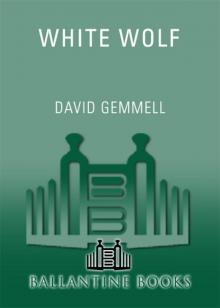 White Wolf
White Wolf Wolf in Shadow
Wolf in Shadow Last Sword of Power
Last Sword of Power Dark Moon
Dark Moon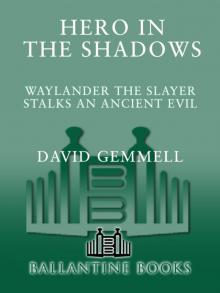 Hero in the Shadows
Hero in the Shadows Gemmell, David - Drenai 09 - Hero In The Shadows
Gemmell, David - Drenai 09 - Hero In The Shadows Waylander
Waylander Shield of Thunder
Shield of Thunder Stormrider Stormrider
Stormrider Stormrider Ghost King
Ghost King Legend
Legend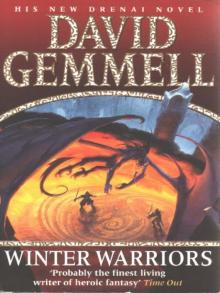 Winter Warriors
Winter Warriors Fall of Kings
Fall of Kings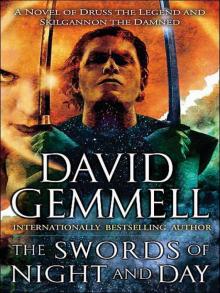 The Swords of Night and Day
The Swords of Night and Day The King Beyond the Gate
The King Beyond the Gate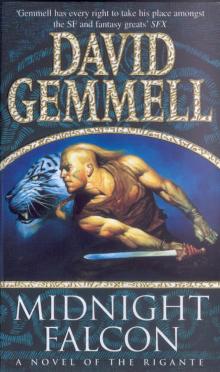 Midnight Falcon
Midnight Falcon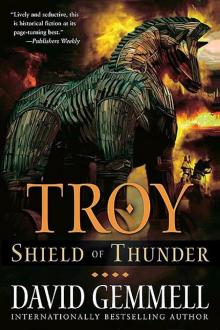 02 - Shield of Thunder
02 - Shield of Thunder In the Realm of the Wolf
In the Realm of the Wolf Ravenheart
Ravenheart The First Chronicles of Druss the Legend
The First Chronicles of Druss the Legend Last Guardian
Last Guardian Stormrider
Stormrider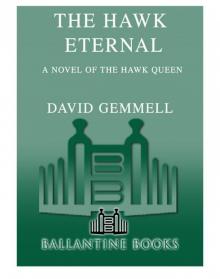 The Hawk Eternal
The Hawk Eternal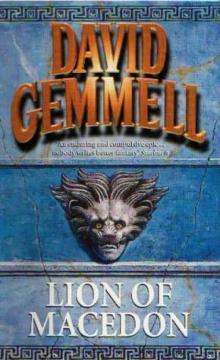 Lion of Macedon
Lion of Macedon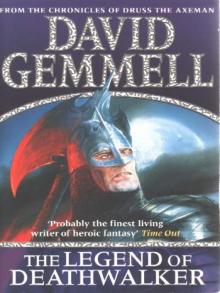 The Legend of Deathwalker
The Legend of Deathwalker Knights of Dark Renown
Knights of Dark Renown Echoes of the Great Song
Echoes of the Great Song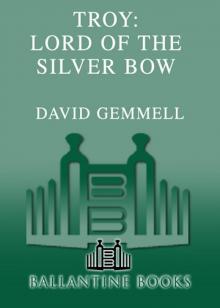 Lord of the Silver Bow
Lord of the Silver Bow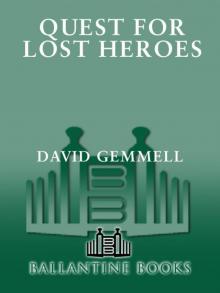 Quest for Lost Heroes
Quest for Lost Heroes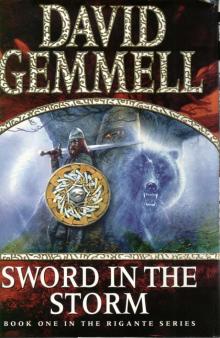 Sword in the Storm
Sword in the Storm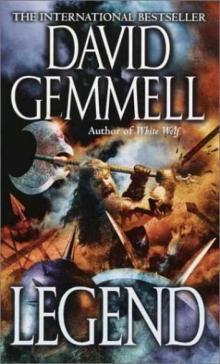 Drenai Saga 01 - Legend
Drenai Saga 01 - Legend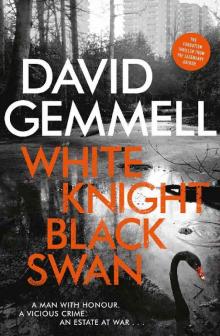 White Knight/Black Swan
White Knight/Black Swan![[Troy 02] - Shield of Thunder Read online](http://i1.bookreadfree.com/i/03/19/troy_02_-_shield_of_thunder_preview.jpg) [Troy 02] - Shield of Thunder
[Troy 02] - Shield of Thunder Lord of the Silver Bow t-1
Lord of the Silver Bow t-1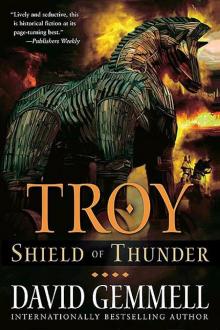 Shield of Thunder t-2
Shield of Thunder t-2 White Wolf: A Novel of Druss the Legend dt-10
White Wolf: A Novel of Druss the Legend dt-10 Drenai Saga 02 - The King Beyond the Gate
Drenai Saga 02 - The King Beyond the Gate Ironhand's Daughter
Ironhand's Daughter Gemmell, David - Drenai 06 - The First Chronicles of Druss the Legend
Gemmell, David - Drenai 06 - The First Chronicles of Druss the Legend The Last Guardian
The Last Guardian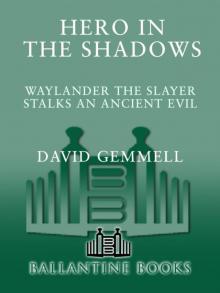 Hero in the Shadows: A Waylander the Slayer Novel
Hero in the Shadows: A Waylander the Slayer Novel The Legend of the Deathwalker
The Legend of the Deathwalker